Complete Solutions to Respiration In Plants of chapter RESPIRATION IN PLANTS of Class 11 book with complete answers and questions
| Class 11 | BIOLOGY |
| Chapter | RESPIRATION IN PLANTS |
| NCERT FINGERTIPS | Respiration In Plants |
| Number Of Questions | 100 |
| Academic Year | 2023-24 |
Identify the correct terms for the given statements and select the correct answer.
(i) Sudden increase in the rate of respiration during ripening of fruits.
(ii) Reduction in the consumption of respiratory substrate when mole of respiration is changed from anaerobic to aerobic.
(iii) Respiratory oxidation of carbohydrates and fats.
View SolutionRespiratory substrates are the organic substances which are _______during respiration to liberate energy.
View SolutionInstantaneous source of energy is
View SolutionComplete the following biochemical equation of respiration and select the correct answer.
`C_(6)H_(12)O_(6)+ 6O_(2) rarr`
View SolutionThe respiration in germinating seeds produces energy which can be detected in the form of
View SolutionSeeds respire in
View SolutionRise in the water level from X to Y in the given experimental set-up demonstrates
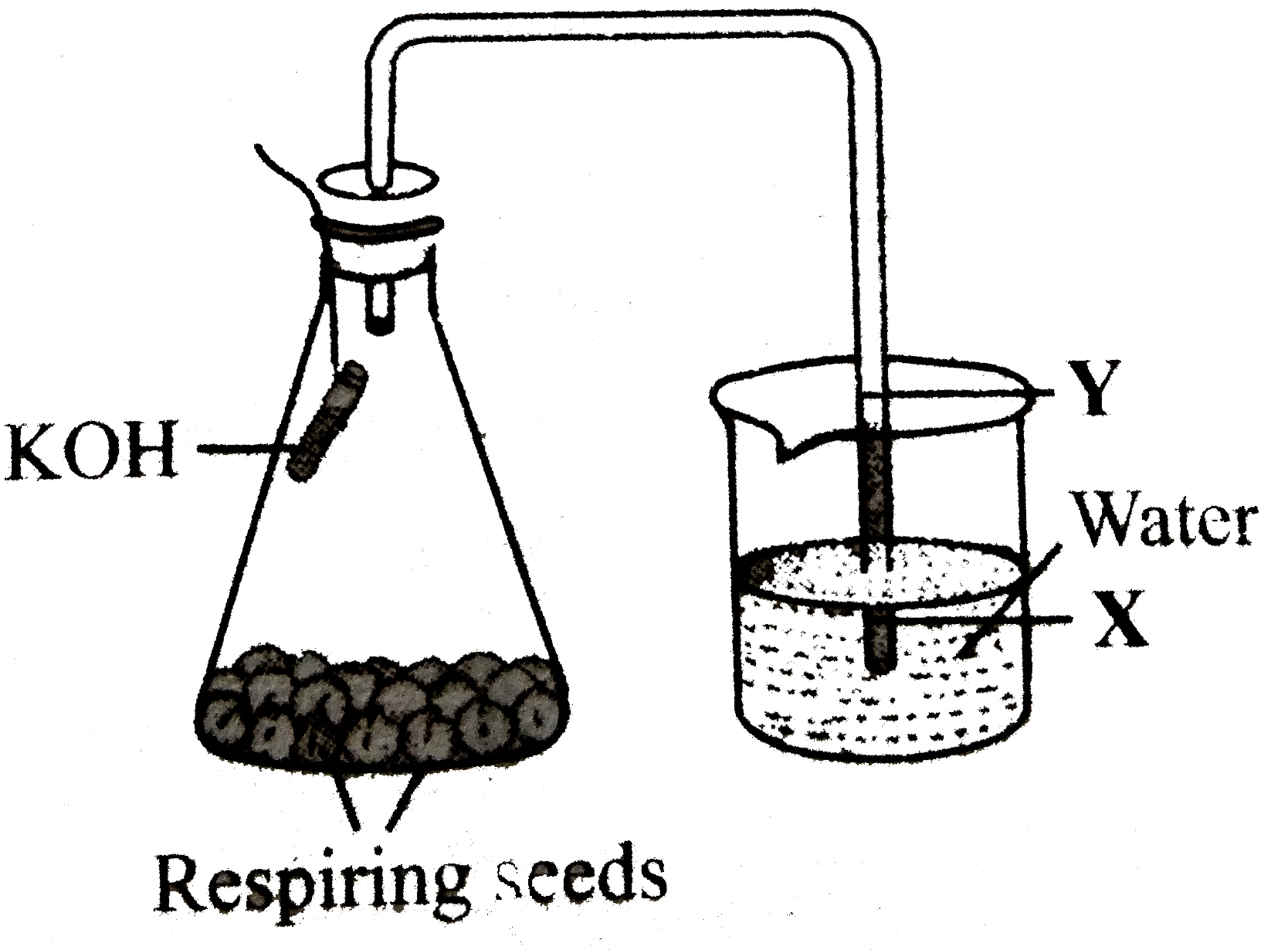
View SolutionThe pathway of respiration common in all living organisms is `ul(x)`, it occurs in the `ul(y)` and the products formed are two molecules of `ul(Z)`. Identify X,Y and Z in the above paragraph and select the correct answer.
View SolutionSelect the wrong statements with respect to glycolysis.
View SolutionStudy the given steps of glycolysis and identify the enzymes (i),(ii) and (iii) responsible for carrying out these steps.
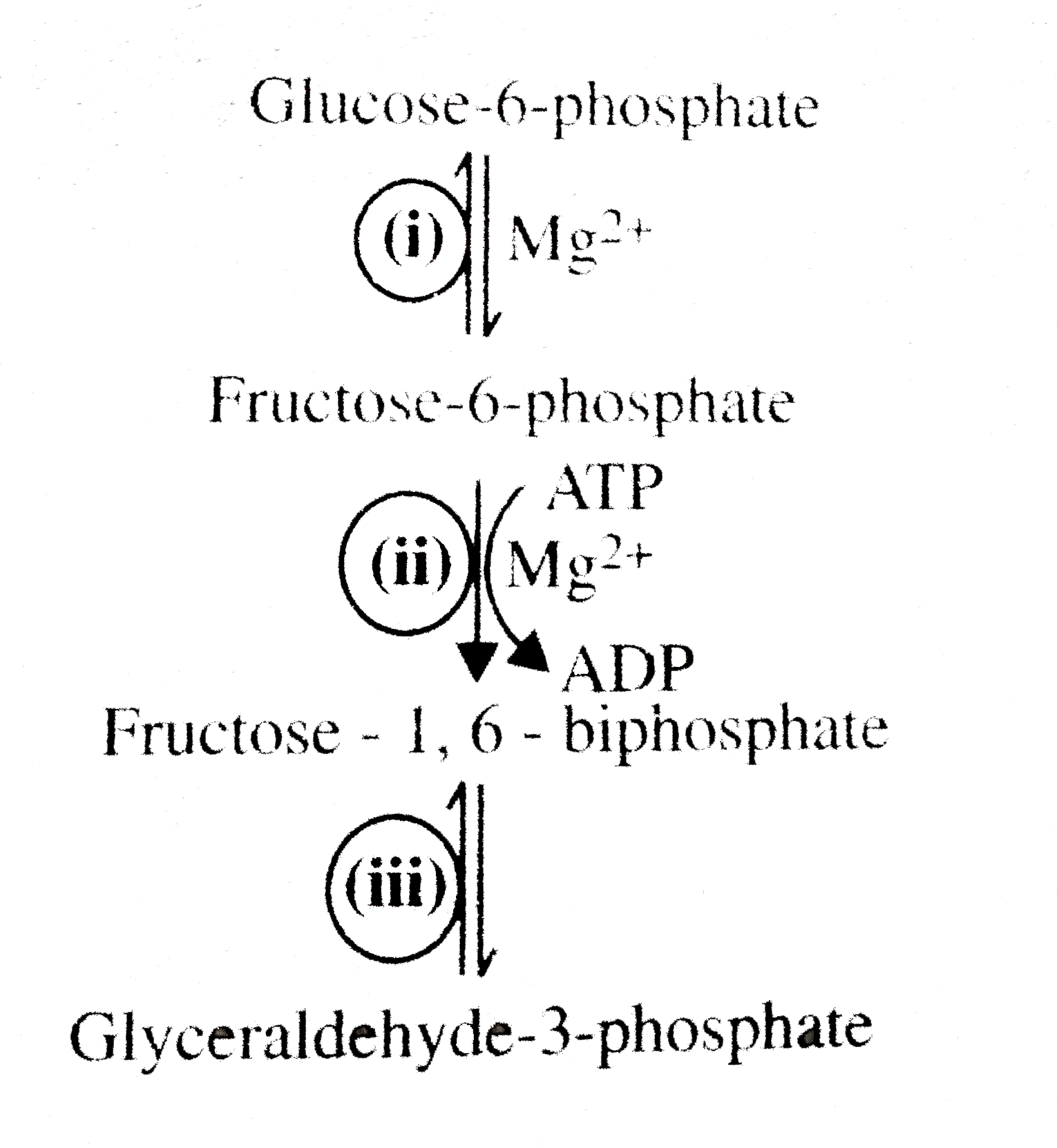
View SolutionThe flow chart given below shows the steps in glycolysis. Select the option that correctly fills in the missing steps A,B,C and D.
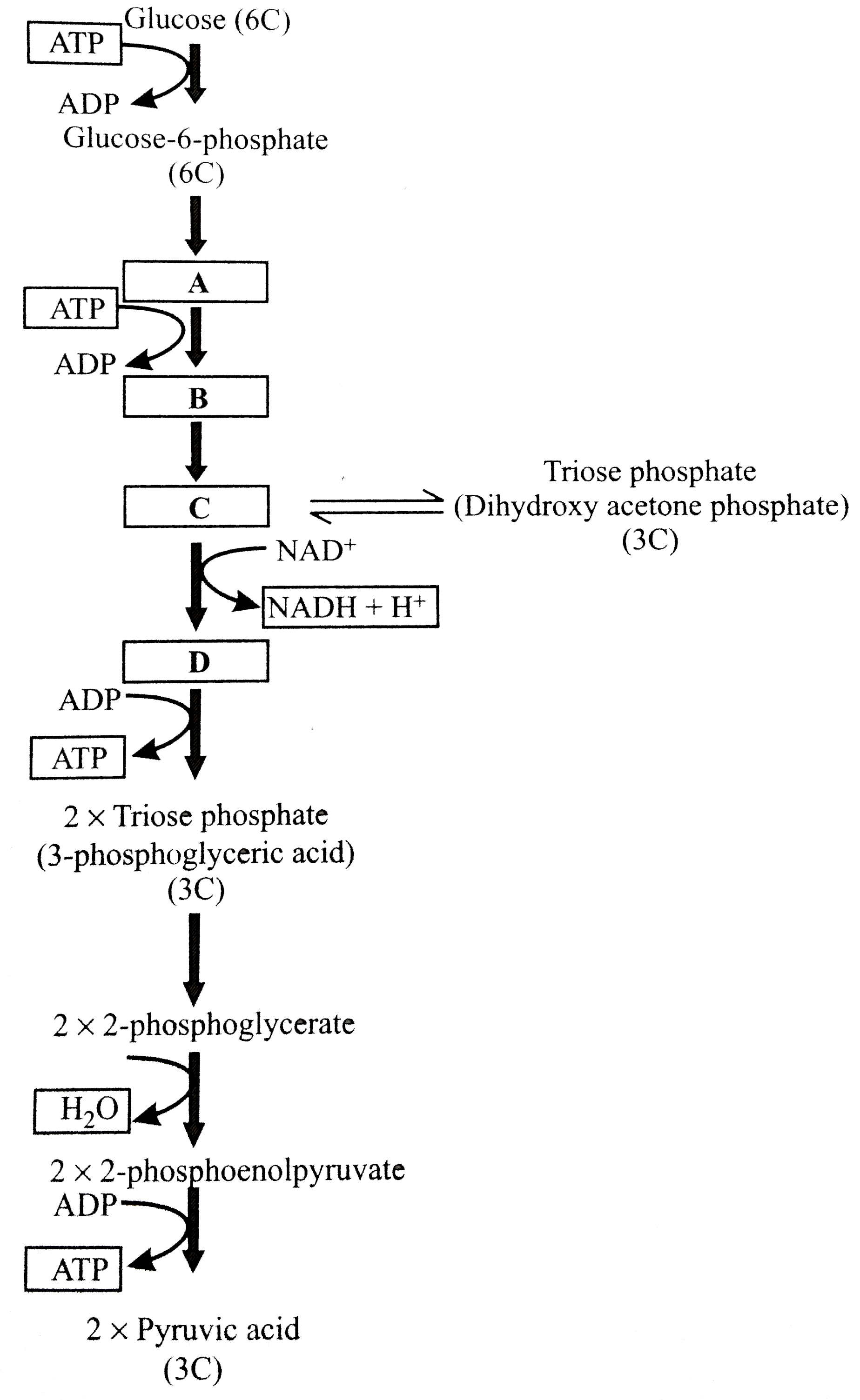
View SolutionWhich of the following are isomers?
View SolutionWhich of the following steps during glycolysis is associated with utilisation of ATP?
View SolutionWhich of the following conversions involve ATP synthesis during glucolysis?
View SolutionAt the end of glycolysis, X is the net energy gain from one molecule of glycose via Y, but there is also energy stored in the form of Z. Identify X,Y and Z.
View SolutionThe net gain of ATP molecules in glycolysis during aerobic respiration is
View SolutionThe end product of glycolysis is
View SolutionWhat is true about the end products of glycolysis?
View SolutionDuring the process of acerobic respiration `ul((i))` gets oxidised and its electrons get transferred to the electron transport chain while in photosyntheis, `ul((ii))` gets oxidised to transfer molecules to the electron transport chain.
View SolutionMatch column I with column II and select the correct option from the codes given below.
`{:(Column I,Column II),(A."Fats made of three fatty acid chains attached to glycerol",(i)"Glycogen"),(B."Glycolysis metabolite made from glycerol",(ii)"Glyceraldehyde"),(C."Storage form of glucose",(iii)"Triglycerides"),(D."Common respiratory substrate of glycolysis",(iv)"Glucose"):}`
View SolutionEthyl alcohol fermetation occurs in
View SolutionAnaerobic respiration takes place in
View SolutionWhich of the molecule listed below is a product of fermentation of glycose by yeast?
View SolutionA test tube containing molasses solution and yeast is kept in a warm place overnight. The gas collected from this mixture
View SolutionWhich of the following options does not hold good regarding anaerobic respiration or fermentation?
View SolutionIdentify the enzymes 1 and 2 in the given reaction and select the correct option.

View SolutionWhat does A,B and C depict in the given pathways of anaerobic respiration ?
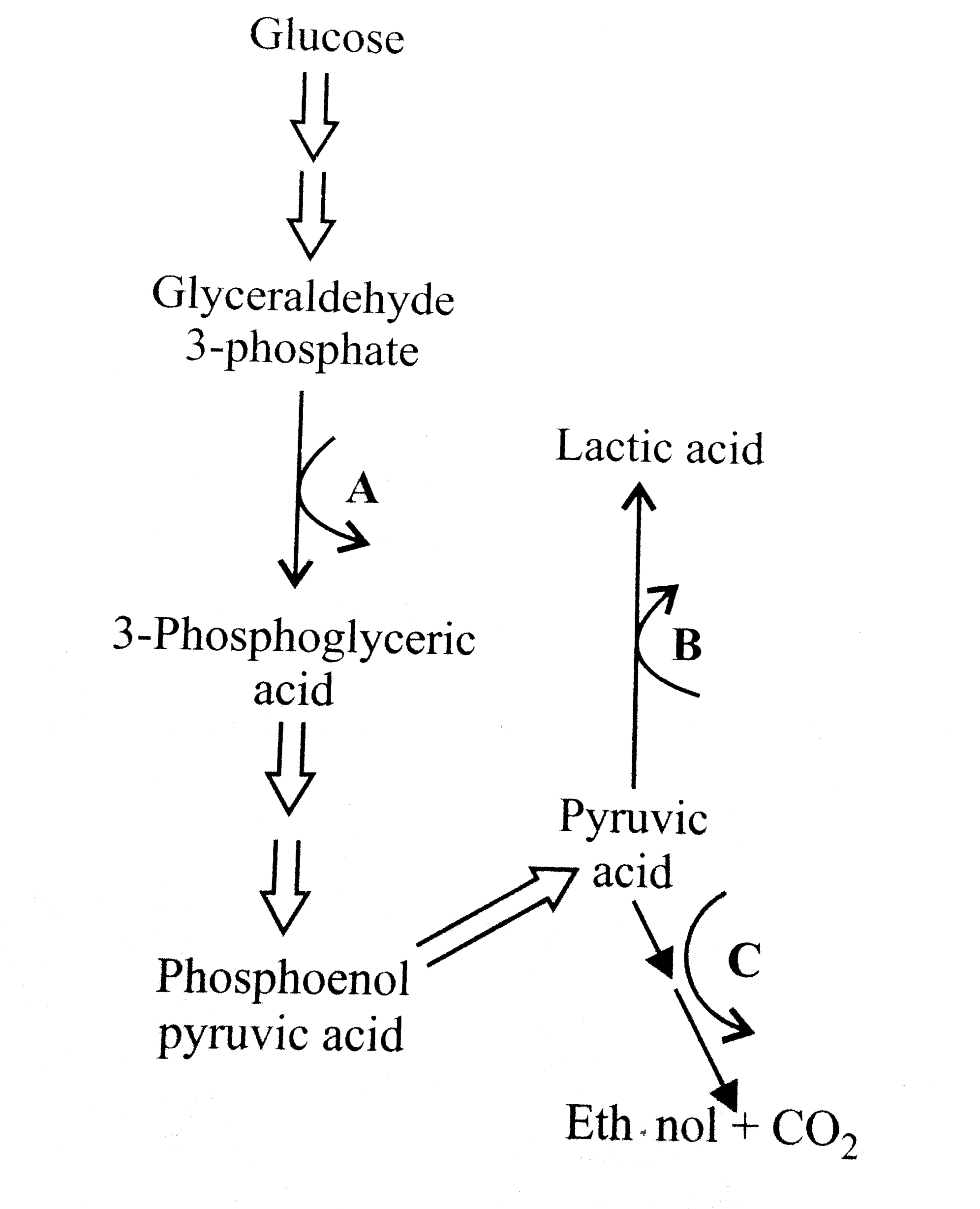
View SolutionThough vertebrates are aerobes, but their `ul((i))` show anaerobic respiration during `ul((iii))`. During this `ul((iii))` of skeletal muscle fibres is broken down to release lactic acid and energy. Lactic acid, if accumulates causes muscle fatigue. Fill up the blanks in the above paragraph and select the correct option.
View SolutionIdentify A,B and C in the given reaction of lactic acid fermentation and select the correct option.
Pyruvic acid `+Aoverset("Lactate dehydrogenase")underset(FMN,ZN^(2+))hArr B+C`
View SolutionSelect the incorrectly matched pair.
View SolutionFermentation is represented by the equation
View SolutionThe given experimental set-up demonstrates
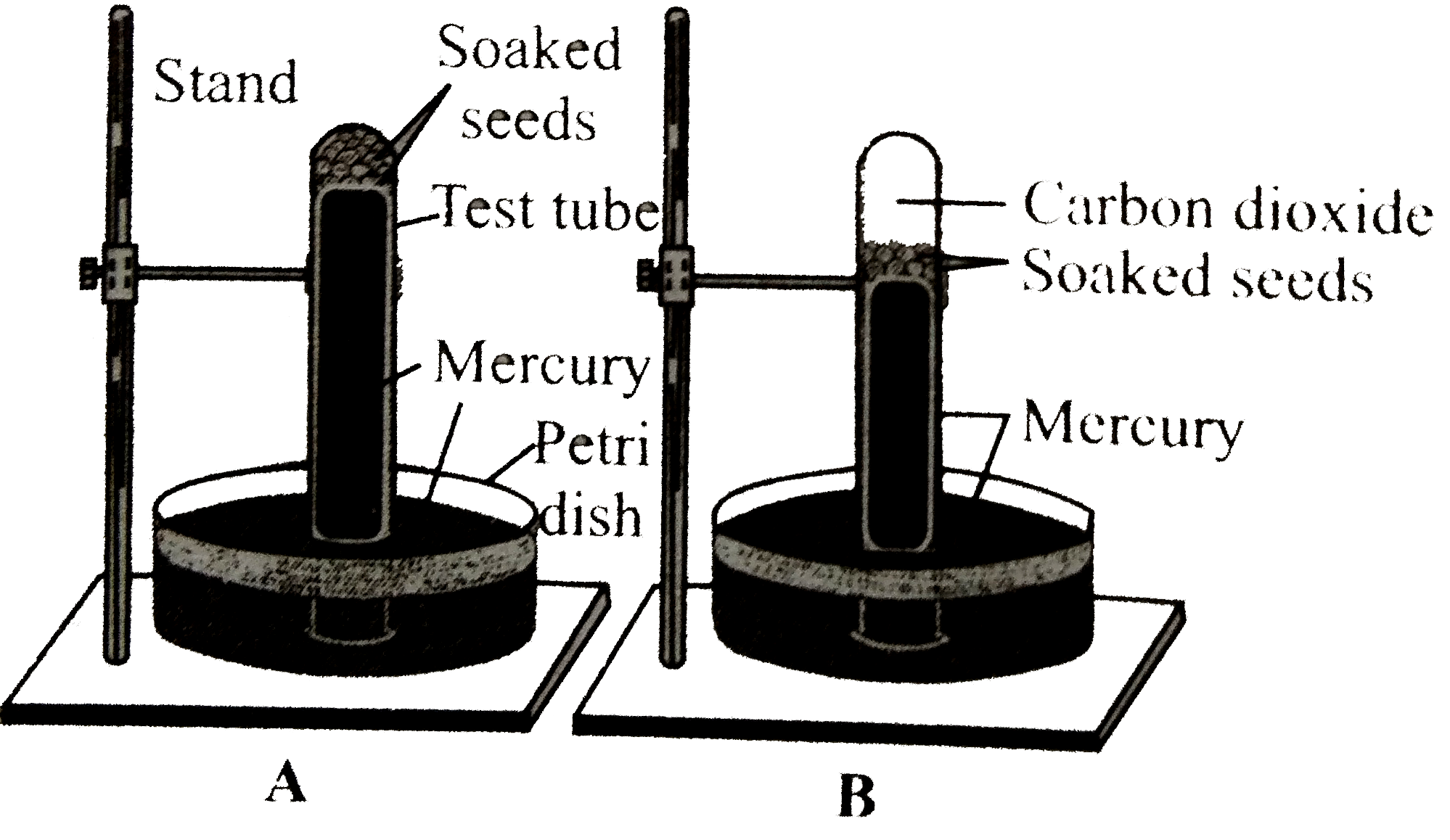
View SolutionMercury (Hg) is generally used in anaerobic respiration experiments because it does not react with_____.
View SolutionWhich of the following describes significance of fermentation?
(i)Prodyction of alcohol in brewing industry
(ii) Making of dough in baking industry
(iii) Curing of tea and tobacco
(iv) Production of vinegar by acteic acid bacteria
View SolutionDough kept overnight in warm weather becomes soft and spongy due to
View SolutionSite of Krebs' cycle in mitochondria is
View SolutionRead the given statements and select the correct option.
Statement 1: Glycolysis occurs in mitochondrial matrix.
Statement 2: Krebs' cycle occurs on cristae of mitochondria.
View SolutionFate of pyruvic acid during aerobic respiration is
View SolutionPyruvate dehydrogenase is used in converting
View SolutionIdentify A and B in the given reaction.
`Pyruvic acid +CoA + NAD^(+) overset(Mg^(2+))underset("Pyruvate dehydrogenase")rarr A+B +NADH +H^(+)`
View SolutionWhich step is called gateway step/link reaction in aerobic respiration?
View SolutionAlternate name of Krebs' cycle is
View SolutionKrebs' cycle starts with the formation of a six carbon compound by reaction between
View SolutionIn krebs' cycle OA A accepts acteyl CoA to form
View SolutionWhich of the following is a 4-carbon compound?
View SolutionIdentify X,Y and Z in the given diagram representing steps of citric acid cycle and select the correct option.
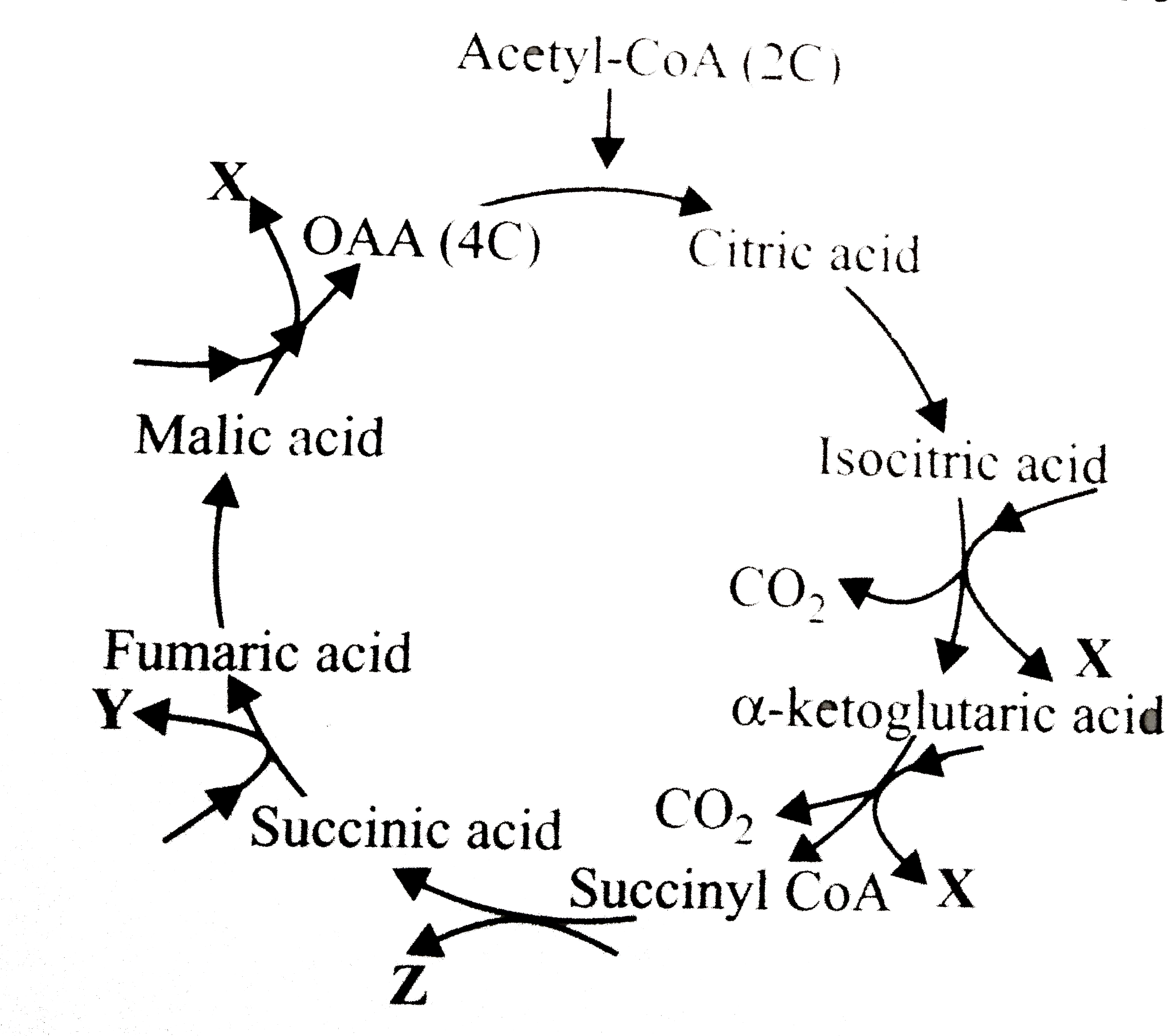
View SolutionConsider the first reaction of TCA cycle.
Acetyl `CoA + OA A +H_(2)O overset("Citrate")underset("synthase")rarr A + CoA` What is true about compound A?
View SolutionIdentify enzyme A in the given reaction of Krebs' cycle
`underset((4C))(OA A) +"Acety"1-CoA +H_(2)O overset(A)rarr underset((6C))("Citric acid") +CoA`
View SolutionKrebs' cycle is also called metabolic sink as it is a common pathway for
View SolutionThe intermediate product between `alpha`-ketoglutaric acid and succinic acid in TCA cycle is
View SolutionSelect the correct sequence of formation of given intermediates of Krebs' cycle.
View SolutionSubstrate level phosphorylation occurs during which step of Krebs' cycle
View SolutionThe first 5C dicarboxylic acid in Krebs' cycle whic is used in nitrogen metabolism is
View SolutionWhich of the following steps is associated with ATP formation (substrate level phosphorylation)?
View SolutionFAD participates in Krebs' cycle as electron acceptor during conversion of
View SolutionSelect the correct statement.
View SolutionAll enzymes of TCA cycle are located in the mitochondrial matrix except one which is located in inner mitochondrial membranes in eukaryotes and in cytosol in prokaryotes. This enzyme is
View SolutionCategorise the given equations under respective phases and select the correct option.
I. `C_(6)H_(12)O_(6) +2NAD^(+) +2ADP +2Pi rarr 2C_(3)H_(4)O_(3) +2ATP +2NADH +2H^(+)`
II. Pyruvic acid `+4NAD^(+) +FAD^(+) +2H_(2)O +ADP +Pi rarr 3CO_(2) +4NADH +4H^(+) +ATP +FADH_(2)`
III.
View SolutionWhich of the following steps of respiration is amphibolic ?
View SolutionWhen two molecules of acetyl CoA enter the TCA cycle, net gain at the end of the cycle is
View SolutionIdentify the three components [(i),(ii) and (iii)] of ATP molecule shown in the give figure.
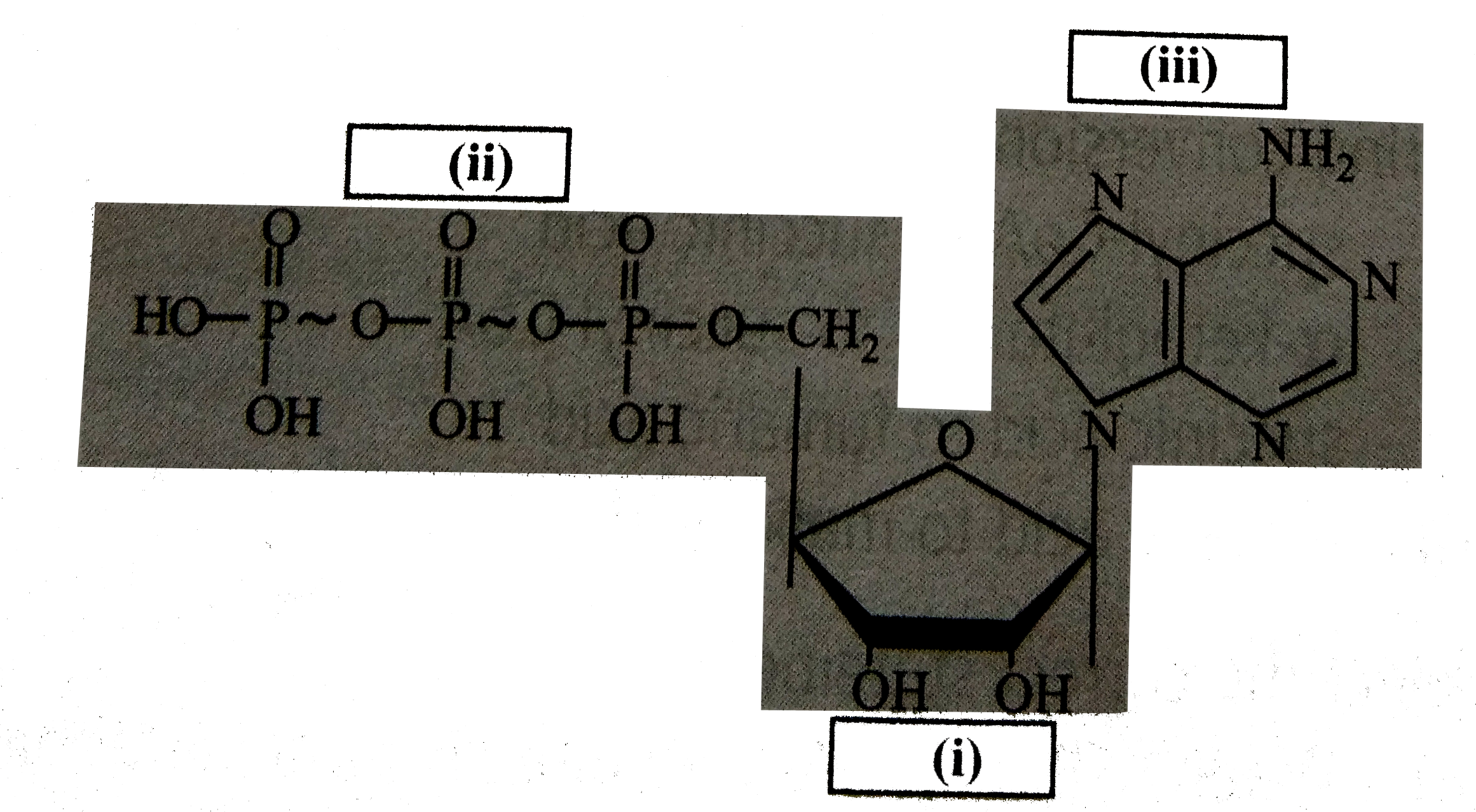
View SolutionAmount of energy released during hydrolysis of a high energy bond of ATP is
View SolutionAll of the following processes can release `CO_(2)` except
View SolutionSelect the option that correctly fills the blanks in the following statements.
A. Glucose has `ul((i))` carbon atoms, pyruvic acid has `ul((ii))` carbon atoms and the acetyl group has `ul((iii))`carbon atoms.
B. Electrons enter the electron transport system as parts of hydrogen atoms attached to `ul((i))` and `ul((ii))`.
View SolutionIdentify P,Q,R and S in the given diagram of electron transport system.
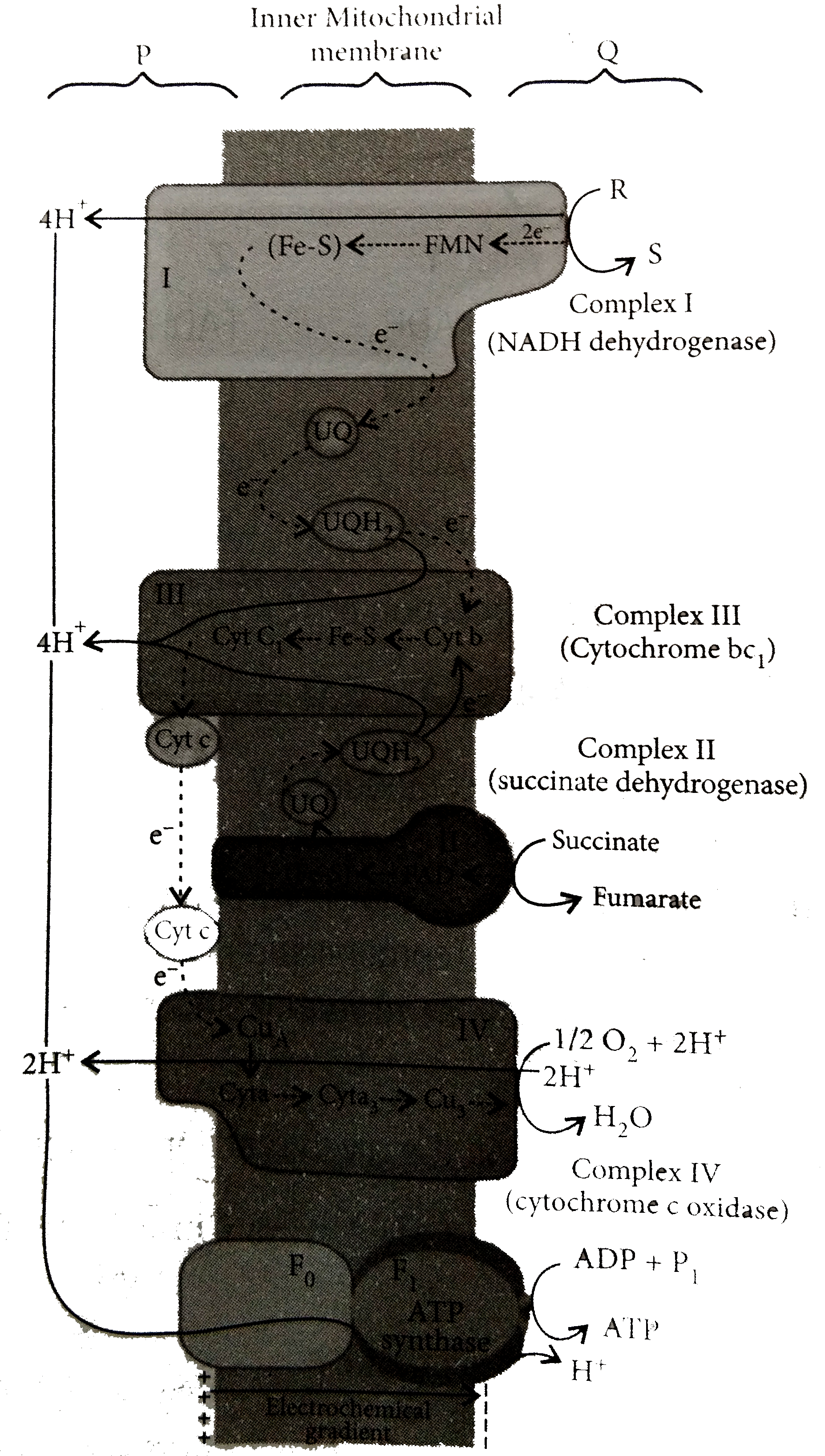
View SolutionMatch column I with column II and select the correct option from the given codes.
`{:(Column I,COlumn II),(A."Glycolysis",(i)"Inner mitochondrial membrane"),(B.TCA "cycle",(ii)"Mitochondrial matrix"),(C.ETS,(iii)"Cytoplasm"):}`
View SolutionElectron transport chain (ETC) is a set of ______ electron carriers present in a specific sequence along _______ mitochondrial membrane.
View SolutionIn the electron transport system present in the inner mitochondrial membrane complexes I and IV are respectively
View SolutionOxidation of one `NADH` and one `FADH_(2)` respectively gives rise to_____and _____ATP molecules.
View SolutionStudy the incorrect statement with respect to an overview of the electron transport system (ETS).
View SolutionLast `e^(-)` acceptor during `ETS` is
View SolutionWhich of these are respiratory poisons or inhibitor of ETC?
View SolutionDuring electron transport system (ETS) electron transport proceeds from carries that have ________redox potential to those having_____redox potential. This electront transport down the energy gradient leads to the formation of ATP from ADP and Pi, which is referred to as___________.
View SolutionRead the given statements and select the correct option.
Statement 1: During photophosphorylation (of photosynthesis), light energy is utilised for the production of proton gradient during ATP synthesis.
Statement 2 : In respiration, energy of oxidation-reduction is utilised for the phosphorylation and thus the process is called oxidative phosphorylation.
View SolutionIdentify A and B in the given diagram showing ATP synthesis in mitochondria.
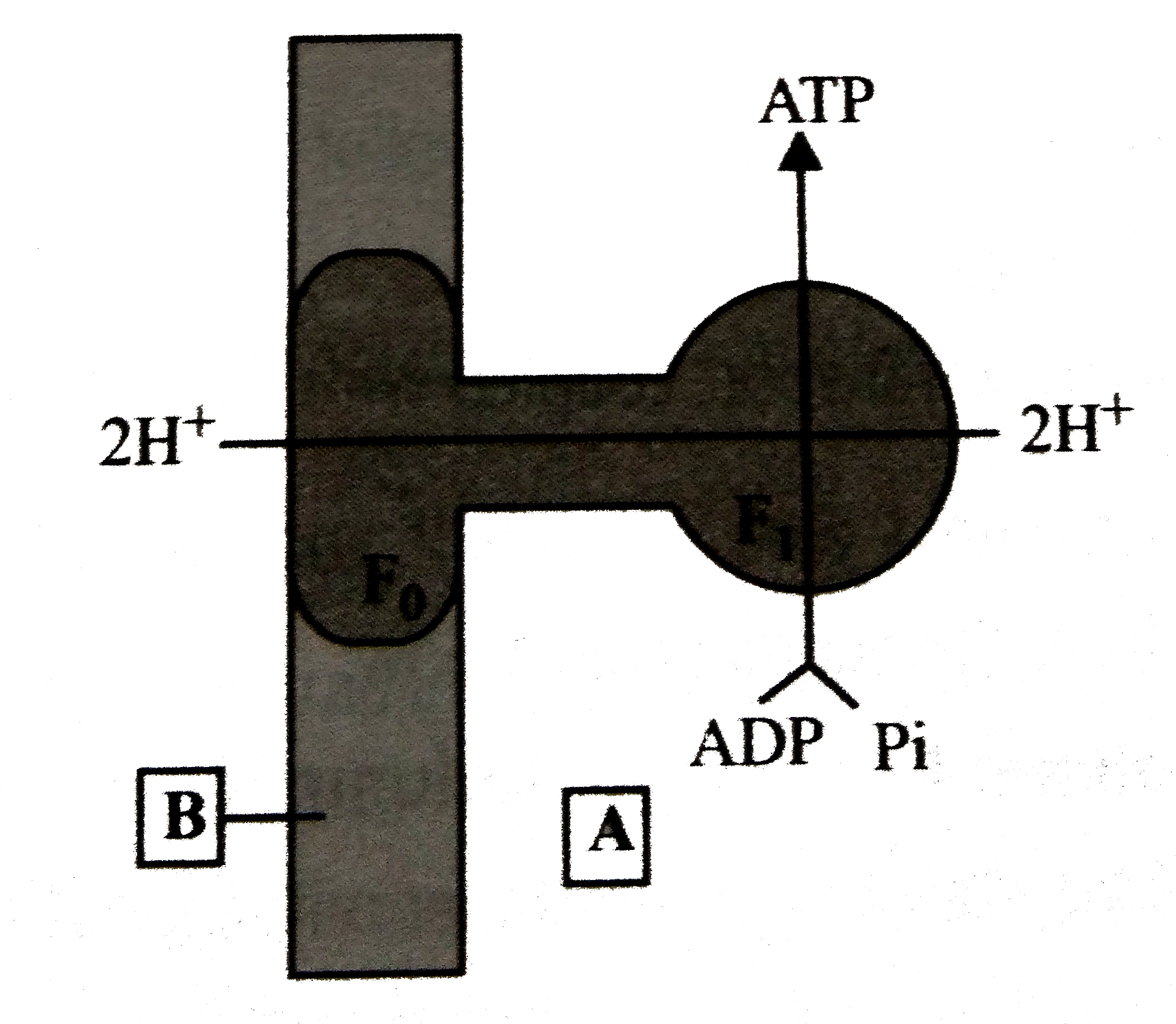
View SolutionAs per chemiosmotic coupling hypothesis, in mitochondria, protons accumulate in the
View SolutionStudy the following statements regarding chemiosmotic hypothesis in mitochondria and select the correct ones.
(i) `F_(1)` headpiece contains the site for the synthesis of ATP from `ADP + Pi`.
(ii) `F_(0)` par forms the channel through which protons cross the inner membrane.
(iii) For each ATP produced, `2H^(+)` pass through `F_(0)` from the intermembrane space to the matrix down the electrochemical proton gradient.
View SolutionSelect the wrong statement.
View SolutionWhich of the following cellular metabolic processes can occur both in the presence or absence of `O_(2)`?
View SolutionMatch column I with colum II and select the correct option from the codes given below.
`{:(ColumnI,ColumnII),(A.TCA "cycle",(i)"Inner mitochondrial membrane"),(B.F_(0)-F_(1)"particles",(ii)"Hans Krebs"),(C."End product of glycolysis",(iii)"Oxidative decarboxylation"),(D."Pyruvate dehydrogenase",(iv)"Pyruvic acid"):}`
View SolutionSelect the correct statements.
(i) Between temperature range `0 - 25^(@)C`, rate of respiration doubles for every `10^(@)C` rise in temperature.
(ii) Cytochromes are iron-porphyrin compounds.
(iii) Respiratory rate of wounded or injured plant parts generally decreases.
View SolutionWhich of the following statements is correct with respect to the effect of temperature on rate of respiration ?
View SolutionDuring complet metabolism of glucose, the number of ATP formed is
View SolutionHow many ATP molecules will be generated in a plant system during complete oxidation of 40 molecules of glucose?
View SolutionThe balance sheet for ATP production in glycolysis has been given below. Select the option which correctly fills up the blanks for P,Q,R and S. ['X' stands for 'nil'].
`{:(Steps,ATP "Utilisation",ATP "Production"),(1."Glucose rarrGlucose-6-phosphate",P,X),(2."Fructose-6-phosphate" rarr "Fructose-1,6-bisphosphate",1,Q),(3.1.3-"bisphosphoglyceric acid"rarr 3-"Phosphoglyceric acid",X,R),(4.2-"Phosphenol pyuvic acid"rarr"Pyruvic acid",S,2):}`
View SolutionRefer to the given figure and select the correct option for A,B,C and D.
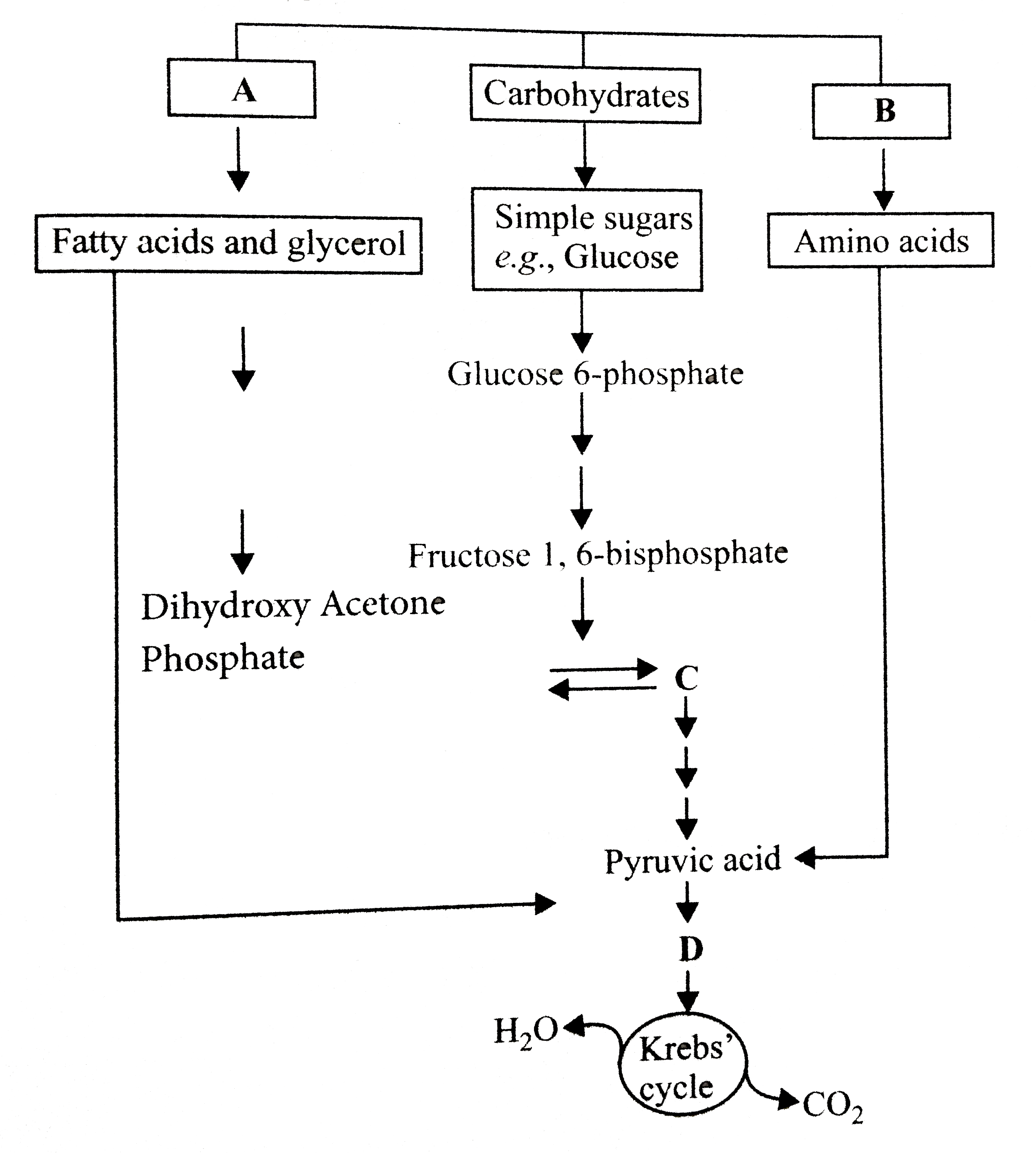
View SolutionWhich of the following statements regarding metabolic pathways is incorrect?
View SolutionRespiratory pathway is
View SolutionRespiratory quotient may be represented as
View Solutionwhich out of the following statements is incorrect ?
View SolutionRespirometer is an instrument used to measure
View SolutionRefer the given equation.
`2(C_(51)H_(98)O_(6)) + 145O_(2) rarr 102CO_(2) +98H_(2)O +` Energy The RQ in this case is
View SolutionConsider the following statements with respect to respiration.
(i) Glycolysis occurs in the cytoplasm of the cell.
(ii) Aerobic respiration takes place within the mitochondria.
(iii) Electron transport system is present in the outer mitochondrial membrane.
(iv) `C_(51)H_(98)O_(6)` is the chemical formula of tripalmitin, a fatty acid.
(v) Respirtoary quotient `=("Volume of"O_(2)"evolved")/("Volume of"CO_(2)"consumed")` of the above statements
View SolutionSelect the wrong statement.
View SolutionRQ of proteins, carbohydrates, fats and organic acids are in order
View SolutionSelect the correct combination of the respiratory substrates and their respective RQs.
View SolutionMatch column I with column II and select the correct option from the codes given below.
`{:(ColumnI,ColumnII),(A.RQ,(i)"Chemiosmotic ATP syntheis"),(B."Mitchel",(ii)"Muscle fatigue"),(C."Cytochromes",(iii)"Inner mitochondrial membrane"),(D."Lactic acid",(iv)"Alcoholic fermentation"),(E."Yeast",(v)"Respirometer"):}`
View SolutionIf volume of `CO_(2)` liberated during respiration is more than the volume of `O_(2)` used, then the respiratory substrate will be
View SolutionValume of RQ in succulents is
View SolutionRQ in anaerobic respiration is
View Solution
Respiration In Plants questions and complete solutions for chapter RESPIRATION IN PLANTS of MTG BIOLOGY (HINGLISH) of Class 11